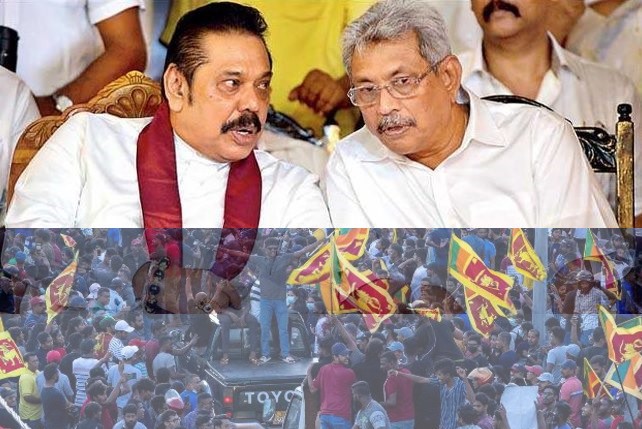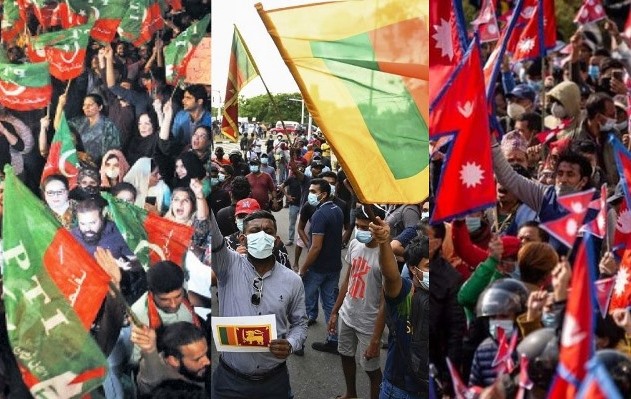Do you remember the sinister White Vans without number plates?
Do you indeed remember the death squad white vans on the streets of Colombo and Jaffna in Sri Lanka, which would suddenly and inevitably appear from nowhere, pick up targeted individuals and disappear? And as the vans would disappear so would the people picked up in public spaces, outside courts coming for trial, inside campuses, right inside market places. The nameless white vans, as the nameless death squads, under the regime of an ever-smiling Mahinda Rajapaksa. The extra-constitutional mafia out in the open and no one could do a damn. Men and women disappeared. Some dead bodies were discovered. Others just vanished into the blue.
The Rajapaksa regime and its police and army would obviously deny any links with the white vans, and their 5 Ws and one H. Kidnappings? Abductions? Disappearances? Torture? Murders in cold blood? So what happened? Did anything at all happen?
Leena Manimekalai: does the name trigger a recent poster memory? Yes, the filmmaker and actor who did the performance-documentary dressed as the goddess of the night on the streets of Toronto and celebrated a film on Kali. (See Those Upset With Kaali Poster Know Little About Divine Imagery). Around 2013, she made a difficult and dangerous film called the White Van Stories, travelling across in this sublime tear drop island surrounded by the sea. A country ravaged by bloody ethnic, communal and religious divides, with the majority community backed by an aggressive Buddhism, almost like that in Myanmar, and patronized by the State, thereby observing all the principles of supremacist racism against the minorities, namely, the Tamils, Muslims, Christians, and, of course, the Leftists, Che Guevarists and Trotskyists.
Leena documented the stories of the disappeared in what would be totally adverse ground conditions with a hostile regime at the helm, amidst a totalitarian surveillance of Orwellian proportions. She travelled across the provinces in the south, east and north. She filmed the stories of the families whose loved ones had simply vanished from the face of the earth. Almost like what happened in Punjab and Kashmir. Or in Bosnia-Herzegovnia, right under the nose of Europe. Indeed, there would be no resolution, no reconciliation, no peace, till they would know the fate of their loved ones – will they ever return?
Leena was then reportedly told to leave the country. She persisted. Her incredibly tragic, disturbing and brave film was premiered on Channel 4. Said Leena: “The making of White Van Stories was not a scripted journey. It was rather mystical. Maybe my constant urge to tell stories that otherwise had been forgotten pointed me towards that direction.”
For instance, the BBC reported (March, 2012): “Amid fresh moves in the UN’s Human Rights Council to hold Sri Lanka to account, the BBC’s Charles Haviland in Colombo reports on a rise in sinister abductions by anonymous squads in white vans…”
“At a small shrine in her home, Shiromani lights a candle and rings a bell, offering prayers to the Hindu deities. She has few consolations now. Her life has been a nightmare since her husband, Ramasamy Prabagaran, a Tamil businessman, was snatched by eight men outside their front door last month, in front of Shiromani and their three-year-old daughter, and taken away in a white van. ‘He was screaming, calling for help, hanging on to the gate,” Shiromani said tearfully…There were people and vehicles in the street but no-one came to help as they had T56 guns and pistols. They pushed me down. I pleaded: ‘Sir, don’t do anything’.”
The vehicle disappeared. And with it, her husband.
Those were also the days of invisible and overt media censorship. Editors in India just could not commission articles or ground reports from Sri Lanka. Journalists would be afraid to write. Several went into hiding or exile.
Earlier, on May 19, 2009, Vellupillai Prabhakharan, the feared leader of the Tamil Tigers (LTTE) was shot dead in North Sri Lanka, after three decades of a bloody civil and guerilla war in which thousands across both sides were killed, including top Sri Lankan leaders. Indian Prime Minister Rajiv Gandhi was assassinated on May 21, 1991, at the behest of Prabhakaran by suicide bombers at Sriperumbudur in Tamil Nada, as an act of the revenge against India for sending the IPKF, the Indian Peace Keeping Force, which was also accused by the Tamil Tigers of inflicting atrocities on Tamils.
ALSO READ: Punjab Disappeared – A Lost Childhood
Prabhakaran, who once reportedly idealized Che Guevara, was no democrat. He had literally wiped out all Tamil opposition to the regime, underground and overground, and chose to speak only the language of the gun and violence. Indeed, his entire family was wiped out, allegedly, after his killing. Mahinda Rajapaksa was then at the helm of affairs, rejoicing a huge burst of Sinhalese pride, as the bloodshed continued, even as innocent Tamil citizens got butchered, inside hospitals and in towns and villages, and even some of them walked with a white flag to surrender. Scores of refugee camps emerged all over Jaffna and in the neighbourhood, and also horrible tales of murder, torture and assaults on men and women. There was an international uproar, but the Rajapaksa regime just could not be touched.
Since then, the Rajapaksa brothers, backed by the majoritarian Sinhalese, and aggressive Buddhists and the army establishment, have called the shots. Since then, a country which seemed self-reliant at one time, with a booming tourist economy, has slumped to a state in contemporary times that even Pat Cummins, the graceful Australian captain, even after an innings defeat at Galle, said that he feels deeply concerned about the situation in Sri Lanka, where its citizens are skipping meals, and not eating on alternate days. The truth is kids of the working class and the poor continue to starve with parents unable to provide even one meal a day.
With a $50 billion foreign debt, which could actually be many times more, severe shortage of food, fuel, cooking gas, medicine etc, for many months, mass unemployment and mass hunger, the Rajapaksas could never even imagine that they would have to run for their lives after leaving their opulent British era palaces to the peaceful protesters. Protesters have converged in Colombo on trains, buses, trucks, walking for miles, demanding that the brothers be held accountable.
Gotabyaya Rajapaksa escaped with his wife on the night of July 12 on a military jet. It only gets to show how the military establishment is still in cahoots with this corrupt and cruel regime. The other brothers are in nameless locations, apparently still holding on to huge amount of wealth in the country and abroad. Protected by the armed forces, it remains a conjecture as to what will be their fate.
If anything, it all confirms the historical lesson that one day miscellaneous dictators, who seem infallible and absolute at one time, too must bite the dust. Reminds us of Batista in Cuba, Causescu in Romania, Jaruzelski in Poland, Idi Amin in Uganda, and Adolf Hitler in Nazi Germany, among others.
There are other lessons. That racist and communal majoritarianism, the State-backed fascism and violent religious polarization cannot be the glue for dictators forever when the economy is in a quagmire and the poor, middle class and the young, all are fed up with the corruption and the injustice.
The Aragalaya movement of concerned and independent citizens, online and door to door, has catalysed and consolidated this massive uprising which continues to this day. They have categorically stated that they want an interim government without the ruling party, and no all-party dispensation. This also proves that this is perhaps the first such spontaneous revolution in the 21st century led by the ordinary people without any ideological or theoretical paradigm or a textbook manifesto, and no organized leadership whatsoever. In that sense, the people of Sri Lanka have shown the way, not only to the world, but also to its neighbours in the subcontinent.

